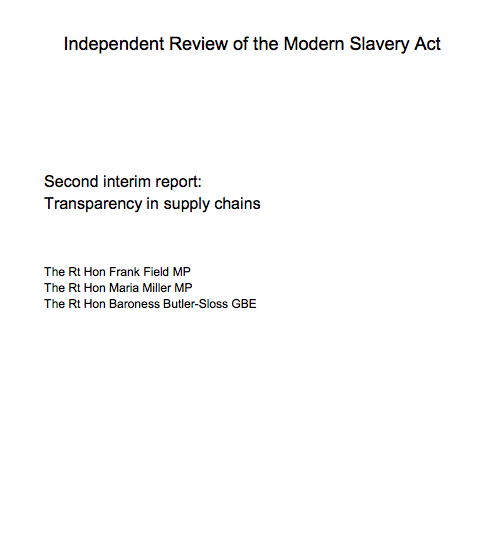It is clear that the Act is an innovative piece of legislation that has influenced parliaments across the world in efforts to combat the global evil of modern slavery. Other countries are following our lead, so it is of the utmost importance that we get this legislation right and properly implemented. Increasing transparency in supply chains is an essential step towards addressing human trafficking and modern slavery in organisations’ supply chains in the UK and overseas. The transparency in supply chains provisions are set out in section 54 of the Act (see Annex B), which requires large commercial organisations supplying good or services, and carrying on a business in the UK, to prepare a slavery and human trafficking statement for each financial year. The company must state the steps it has taken to ensure that slavery and human trafficking is not taking place in its business or its supply chains, or it must state it has taken no such steps.
Section 54 was intended to encourage the private sector to increase transparency. Government wanted to create a level playing field between companies that were already acting responsibly and companies that still needed to change their policies and practices. Although section 54(11) introduced the possibility for the Secretary of State to seek an injunction against non-compliant companies, Government was clear that it would be for consumers, investors and Non-Governmental Organisations (NGOs) to monitor compliance and apply pressure on businesses.
As the first national legislation on this matter, Section 54 of the Modern Slavery Act was ground-breaking legislation. It has contributed to raising awareness of slavery and human trafficking in supply chains and has encouraged many companies to start considering and addressing the issue. However, the impact of the section has been limited to date. Evidence gathered by our Expert Advisers shows that there is a general agreement between businesses and civil society that a lack of enforcement and penalties, as well as confusion surrounding reporting obligations, are core reasons for poor-quality statements and the estimated lack of compliance from over a third of eligible firms.
It is clear the current approach, while a step forward, is not sufficient and it is time for the Government to take tougher action to ensure companies are taking seriously their responsibilities to eradicate modern slavery from their supply chains. The Australian Federal Parliament, which has just passed its own Modern Slavery Act, has gone much further in respect of transparency of supply chains than the provisions established in section 54. The reports from our Expert Advisers on transparency in supply chains will be made available on our website. We also received input from a number of Government departments and agencies. Finally, we undertook some comparative research that looked at similar provisions overseas, namely the Australian Modern Slavery Act and the US Federal Acquisition Regulation. This evidence can be found at Annex C and D.

